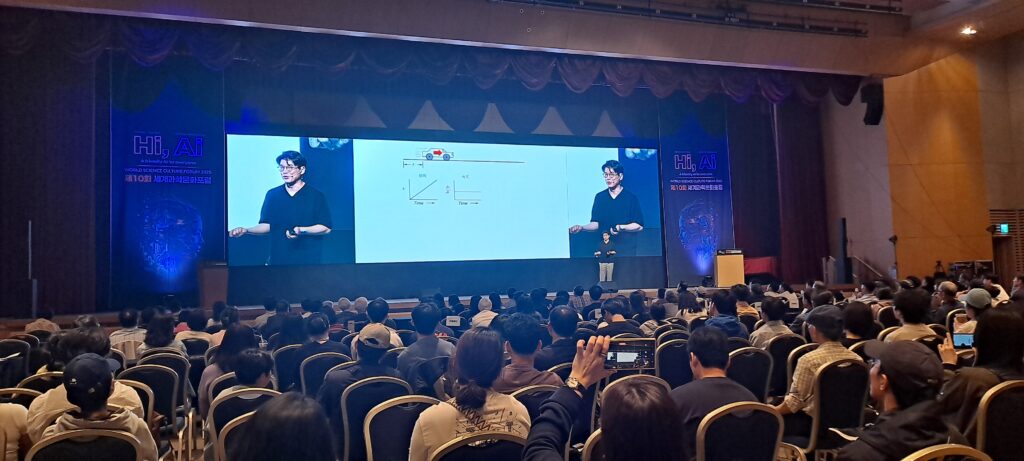On June 20, our student Aqsa gave a talk on the paper “Large language models for scientific discovery in molecular property prediction” at the Journal Club.
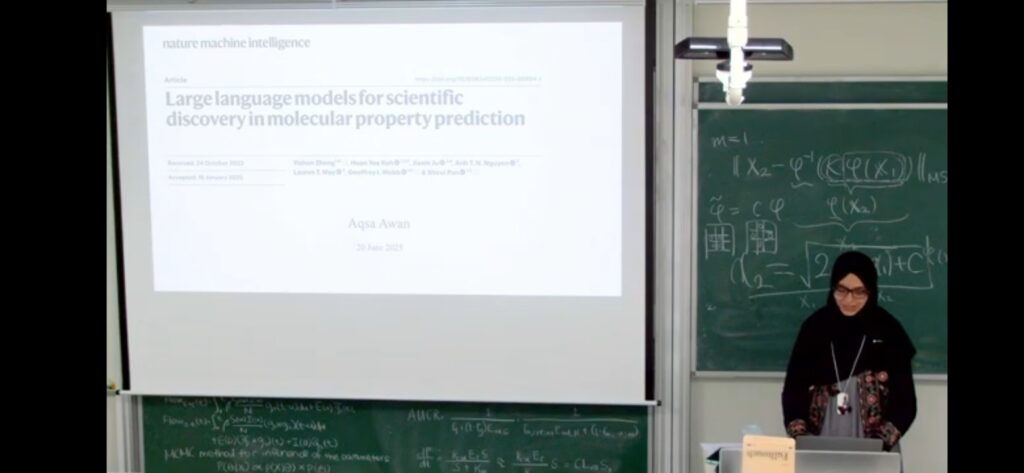
On June 20, our student Aqsa gave a talk on the paper “Large language models for scientific discovery in molecular property prediction” at the Journal Club.

A recent study by BIMAG researchers has been featured in various Korean media outlets. This study proposes a novel method for efficiently and precisely estimating enzyme inhibition constants using only a single inhibitor concentration. The work was co-authored by undergraduate intern Hyeongjun Jang, Dr. Yunmin Song, and corresponding author Prof. Jae Kyoung Kim. The paper, titled “Optimizing enzyme inhibition analysis: precise estimation with a single inhibitor concentration,” was published in Nature Communications in June 2025. [Link to paper]
BIMAG 연구진의 최근 연구가 다양한 한국 언론에 보도되었습니다. 이 연구에서는 효소 저해 상수를 효율적이고 정밀하게 추정할 수 있는 새로운 방법론을 개발했으며, 장형준 학부생 인턴, 송윤민 박사, 책임저자인 김재경 교수가 공동 저자로 참여했습니다. 해당 논문은 2025년 6월 Nature Communications에 “Optimizing enzyme inhibition analysis: precise estimation with a single inhibitor concentration” 라는 제목으로 게재되었습니다. (논문링크)
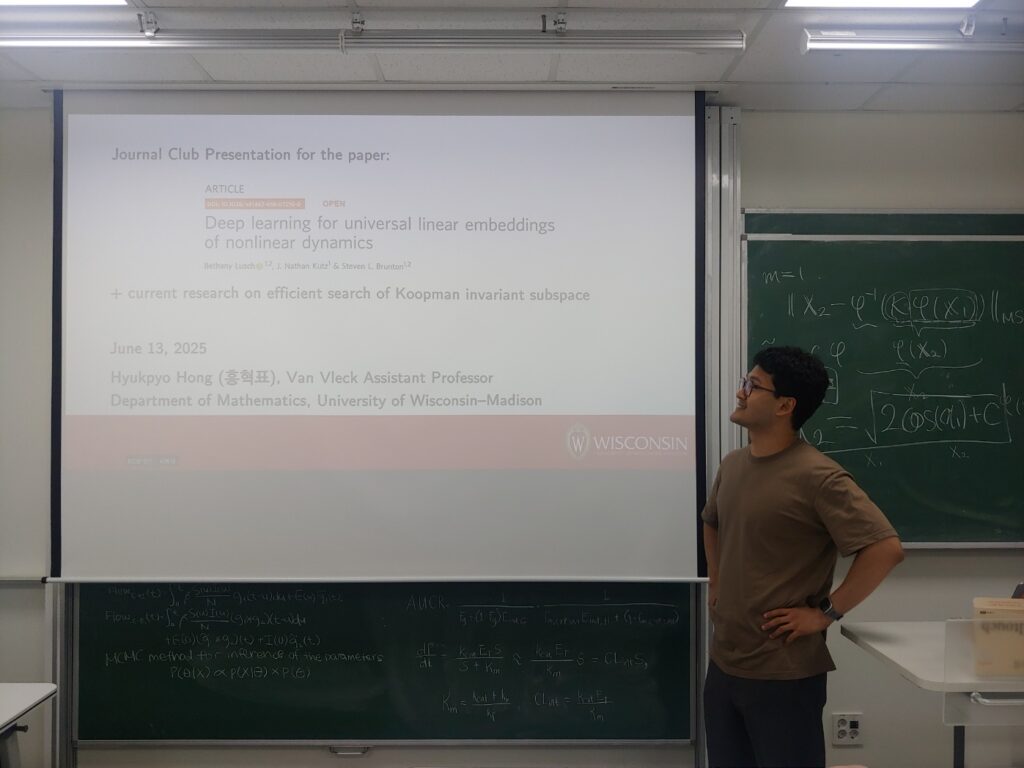
On June 13, our former student, Dr. Hyukpyo Hong visited our group and gave a talk on the paper “Deep learning for universal linear embeddings of nonlinear dynamics” at the Journal Club.
On May 30, our student Kang Min gave a talk on the paper “Direct Estimation of Parameters in ODE Models Using WENDy” at the Journal Club.
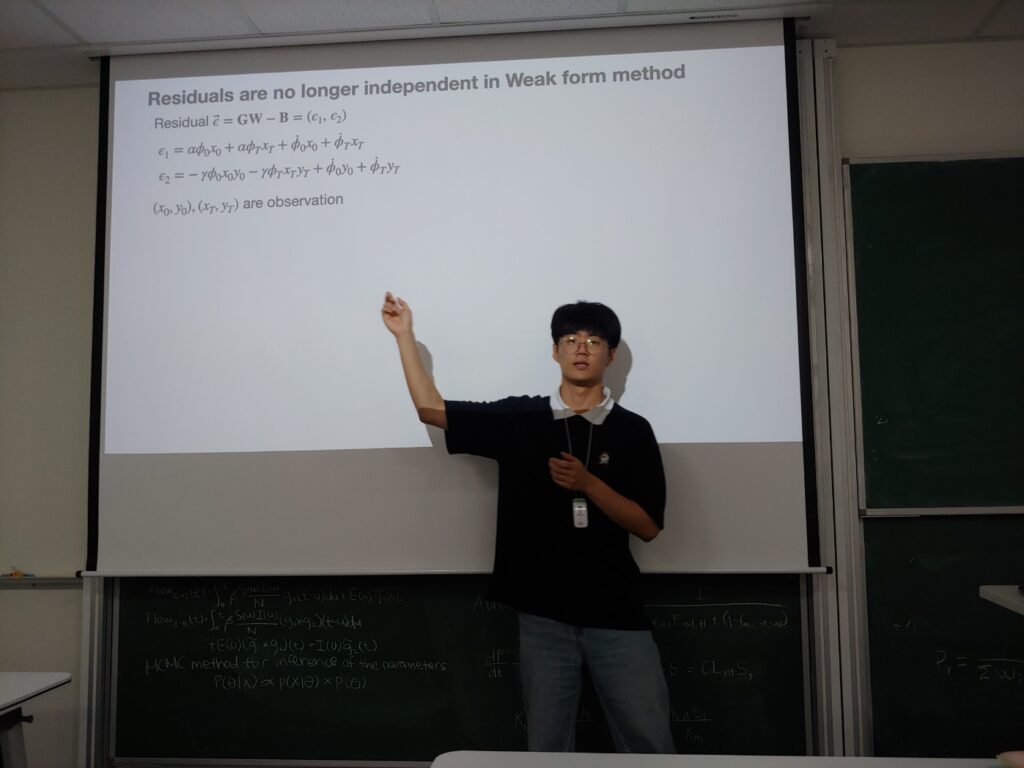
We are pleased to announce the selected participants for the BIMAG 2025 Summer Internship. Congratulations to all those who have been selected!
선정된 BIMAG 2025 여름 인턴십 참가자를 발표합니다. 선정되신 모든 분들께 진심으로 축하의 말씀을 전합니다.
| Intern | Affiliation | Mentor | Project |
| Ji Woo Chae | Bachelor of Arts and Sciences, Dartmouth College | Dongju Lim | Quantifying the uncertainty of predicting human circadian phase by using a mathematical model |
| Heejune So | Dept. of Medicine, University of Galway | Eui Min Jeong | A Machine Learning-Based Development of a Shortened Version of the Pre-Sleep Arousal Scale (PSAS) |
| Seunghyun Seo | Dept of Computer Science, Johns Hopkins | Dongju Lim | Estimating circadian period from wearable data using a machine learning algorithm. |
| Dongyeon Yang | School of Transdisciplinary Studies, KAIST | Dongju Lim | Estimating circadian period from wearable data using a machine learning algorithm. |
| Taiyoon Yeu | Chemical and Biomolecular Engineering, UCLA | Hyeong Jun Jang | Optimizing experimental design for time-dependent inhibition without prior parameter knowledge |
| Hongji Kim | Biology and HOD, Vanderbilt | Hyeong Jun Jang | Develop standardized range of drug for AUC-based drug screening |
| Minah Lee | Math, Chungbuk National University | Myna Lim | A Data-Driven Development of a Shortened Version of the Counterfactual Thinking for Negative Events Scale (CTNES) |
| Dongwoo Won | Dept of Mathematicsl Sciences, KAIST | Kangmin Lee, Gyuyoung Hwang | Developing Transfer Entropy estimation method with Hidden Markov Model, Data-driven inference of phase response curves in oscillator system using physics-informed neural network |
| Hein Lin Thant | Dept of Bio & Brain engineering, KAIST | Dongju Lim | Addressing bias in mathematical model-based DLMO prediction |
| Sangho Kil | Dept of Life Science, Seoul National University | Dongju Lim | Revealing the molecular-level mechanism of mood change from circadian phase resetting |
| Daewon Jeong | Applied mathematics, Pukyong National University | Yun Min Song | Investigating the Impact of Excessive Sleep on Insomnia |
| Jaehee Seo | Biochemistry, Yonsei University | Kévin SPINICCI | Assessing similarity cell to detect cell-type population in scRNA-seq data |
| Thuy Trang Nguyen | School of Computing and School of Business and Technology Management, KAIST | Olive Cawiding | Reducing False Positives in Causal Detection via Temporally-Constrained Surrogate Testing |
| Hyunkyeong Park | Computer Convergence Software, Korea University(Sejong) | Yun Min Song | Optimization of Mathematical Models for Predicting Alertness |
| Yoon Kim | Pure and Applied Mathematics, Tsinghua University | Yun Min Song | Sleep-Wake Prediction Using Activity Count |
| Jinyoung Kim | Dept. of Mathematics, POSTECH | Eui Min Jeong | Oscillatory Transcriptional Factor Dynamics Delay Gene Expression Decoding Compared to Sustained Dynamcis and Modulate Cell Fate |
| Jaehun Jeong | Dept. of Chemistry, Seoul National University | Gyuyoung Hwang | Symmetry in oscillations and its influence on the frequency gap in coupled oscillator systems. |
| Dasom Lee | Department of Big Data Science, Korea University Sejong Campus | Dongju Lim | Developing the early warning signal detection method based on predictability |
Congratulations to CI Prof. Jae Kyoung Kim on his appointment to the editorial board of SIAM Journal on Life Sciences.
CI 김재경 교수가 SIAM Journal on Life Sciences의 편집위원으로 합류했습니다. 축하합니다.
On May 9, 2025, the research conducted by members of BIMAG was featured in SIAM News. The study, which focused on predicting mood episodes using only sleep and circadian rhythm features, was highlighted in an article titled “Predicting Mood Episodes Based on Sleep and Circadian Rhythm Features.”
2025년 5월 9일, BIMAG 연구진의 연구가 SIAM News에 소개되었습니다. 이 연구는 수면 및 생체 리듬 관련 특성만을 이용해 기분 에피소드를 예측하는 내용을 담고 있으며, “Predicting Mood Episodes Based on Sleep and Circadian Rhythm Features”라는 제목의 기사로 보도되었습니다.
News link: (link)
On May 9, our student Olive gave a talk on the paper “Network inference from short, noisy, low time-resolution, partial measurements: Application to C. elegans neuronal calcium dynamics” at the Journal Club.
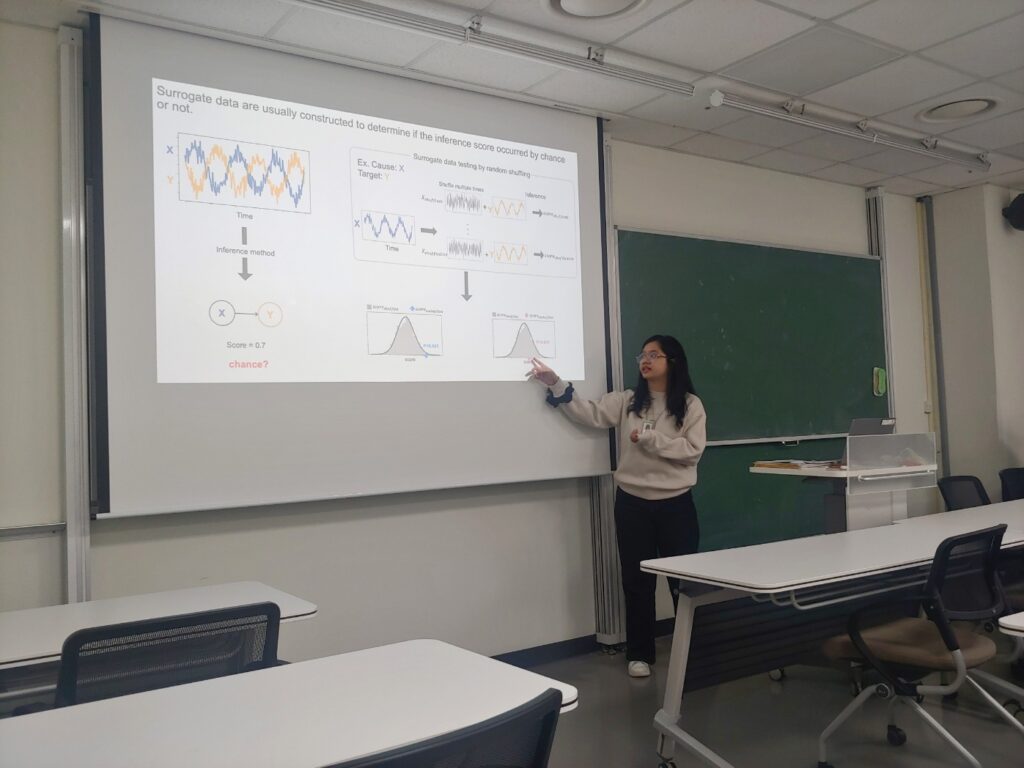
We are pleased to welcome Dr. Jin Woo Hyun to our group as a Postdoc fellow.
Dr. Jin Woo Hyun received his Ph.D. from the Department of Mathematics at Hankuk University of Foreign Studies. His research focuses on mathematical modeling and algorithmic optimization in machine learning. We sincerely welcome him to the team and look forward to his contributions!
현진우 박사가 박사 후 연구원으로 BIMAG에 합류하게 되었습니다.
현진우 박사는 한국외국어대학교 수학과에서 박사학위를 받았으며, 머신러닝 분야의 수학적 모델링 및 알고리즘 최적화 연구를 하고 있습니다. 그의 합류를 진심으로 환영하며, 앞으로의 활약을 기대합니다!
On April 19th, CI Prof. Jae Kyoung Kim gave a public talk at the World Science Forum 2025, held at the Daejeon Convention Center. His talk was titled, “The Beginning and End of AI is Mathematics: Where is the Math We’ve Learned Actually Used?”
2025년 4월 19일, CI 김재경 교수가 대전컨벤션센터에서 열린 2025 세계과학포럼(World Science Forum)에서 “AI의 시작과 끝은 수학: 우리가 배운 수학, 어디에 쓰일까?”라는 제목으로 대중 강연을 진행했습니다.
